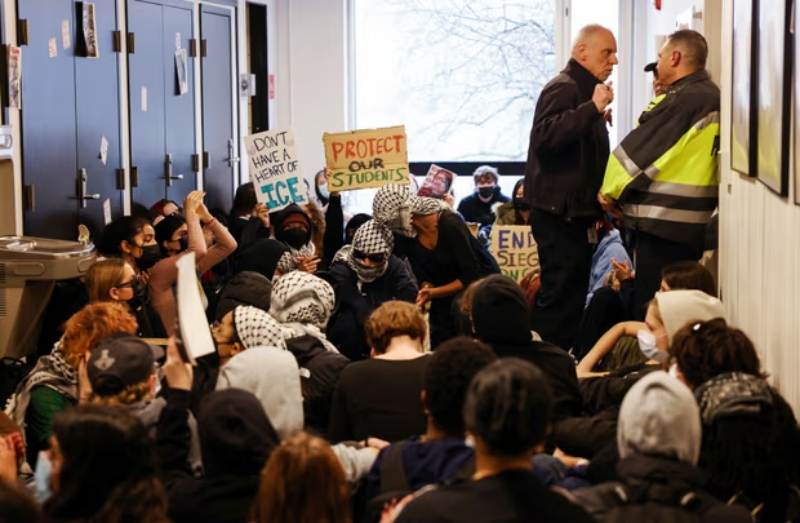Some cases were related to activism and participation in protests against Gaza war, others were for 'minor crimes’

Students protest outside the office of the dean of students at Boston University on 3 April 2025. Photograph: Jessica Rinaldi/The Boston Globe via Getty Images
Late last month, it was reported that the state department had revoked 300 or more student visas in the three weeks that its “Catch and Revoke” program was in operation.
The initiative, newly launched by the state department, which says it is at least partly powered by artificial intelligence (AI), scrapes social media to find “foreign nationals who appear to support Hamas or other designated terror groups” and cancel their visas, according to reporting from Axios.
The secretary of state, Marco Rubio, confirmed the scale of the March crackdown and referred to the student activists as “lunatics”. He told reporters during a visit to Guyana in South America when asked about the visa terminations: “Maybe more than 300 at this point” have lost their visas. “We do it every day, every time I find one of these lunatics.”
It was increasingly clear that the abrupt visa cancellations are not limited to students who engage in pro-Palestinian activism. Students with minor non-criminal infractions, such as speeding tickets, were also targeted.
The Guardian previously reported on an online data sheet created and updated by affected students that showed students from 50 universities reporting their visas were canceled around 4 April , with some tracing the cause to police citations or non-criminal offenses.
Students at the University of Florida have planned a campus protest in support of Felipe Zapata Velázquez, 27, a Colombian student deported by the Trump administration following his arrest for alleged traffic violations.
Late last month, it was reported that the state department had revoked 300 or more student visas in the three weeks that its “Catch and Revoke” program was in operation.
The initiative, newly launched by the state department, which says it is at least partly powered by artificial intelligence (AI), scrapes social media to find “foreign nationals who appear to support Hamas or other designated terror groups” and cancel their visas, according to reporting from Axios.
The secretary of state, Marco Rubio, confirmed the scale of the March crackdown and referred to the student activists as “lunatics”. He told reporters during a visit to Guyana in South America when asked about the visa terminations: “Maybe more than 300 at this point” have lost their visas. “We do it every day, every time I find one of these lunatics.”
It was increasingly clear that the abrupt visa cancellations are not limited to students who engage in pro-Palestinian activism. Students with minor non-criminal infractions, such as speeding tickets, were also targeted.
The Guardian previously reported on an online data sheet created and updated by affected students that showed students from 50 universities reporting their visas were canceled around 4 April , with some tracing the cause to police citations or non-criminal offenses.
Students at the University of Florida have planned a campus protest in support of Felipe Zapata Velázquez, 27, a Colombian student deported by the Trump administration following his arrest for alleged traffic violations.
His family said he was “undergoing a physical and emotional recovery process” in his home country after police arrested him on 28 March for offenses that included having an expired tag and suspended driver’s license, before turning him over to Immigration and Customs Enforcement (Ice).
The Florida Democratic congressman Maxwell Frost accused authorities of “kidnapping” Velázquez, who held an F-1 student visa. “Felipe Zapata Velázquez is just the latest victim of Trump’s disgusting campaign against immigrants,” Frost said in a statement.
Two other cases which received widespread attention were those of Mahmoud Khalil, a recent Columbia University graduate who led pro-Palestinian demonstrations on campus last summer, and Rumeysa Ozturk, a Turkish student at Tufts University who was arrested in apparent retaliation for an op-ed she wrote that was critical of Israel. Both are in Ice detention fighting their deportations on the grounds that their actions constituted free speech under the first amendment.





